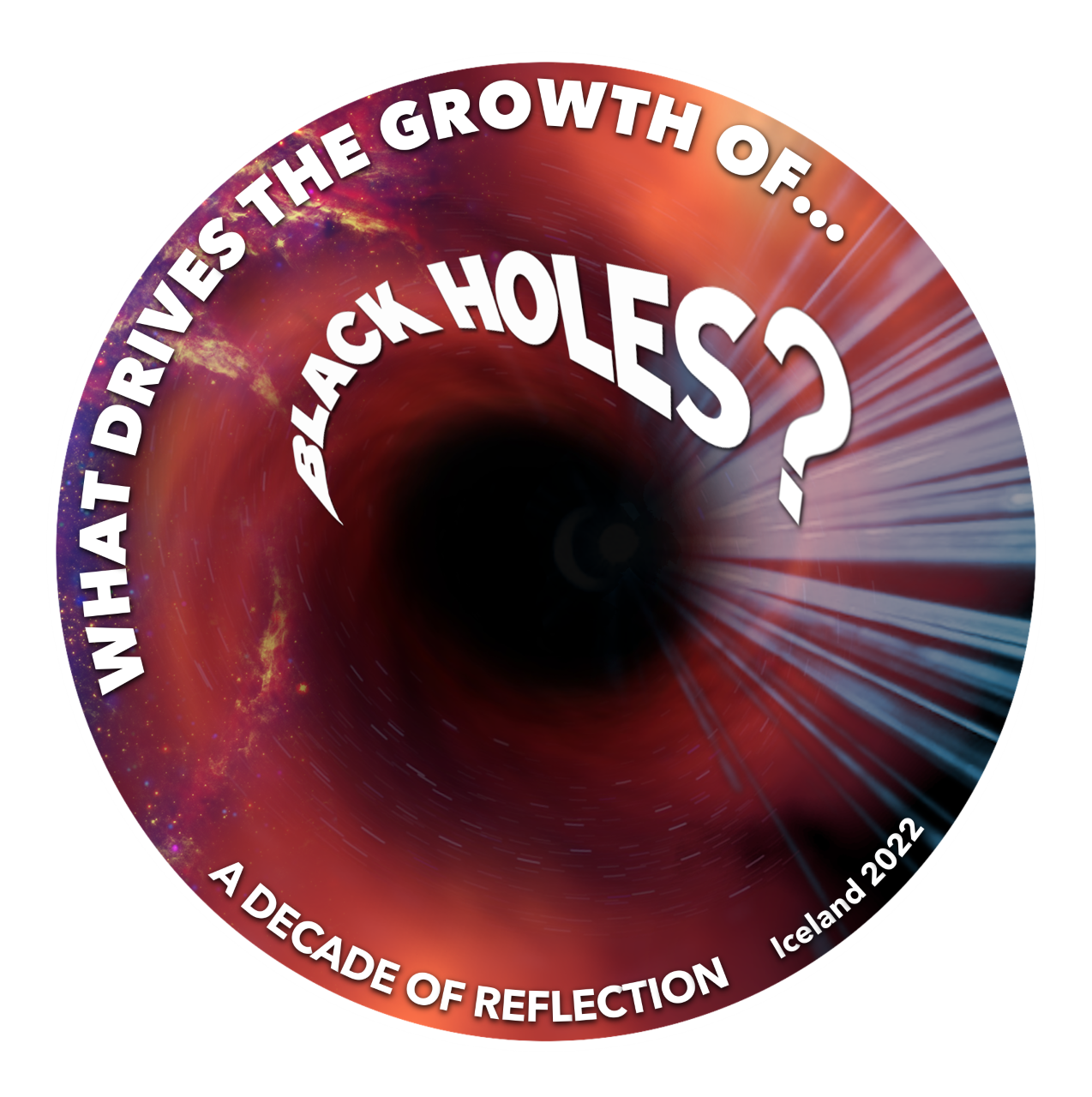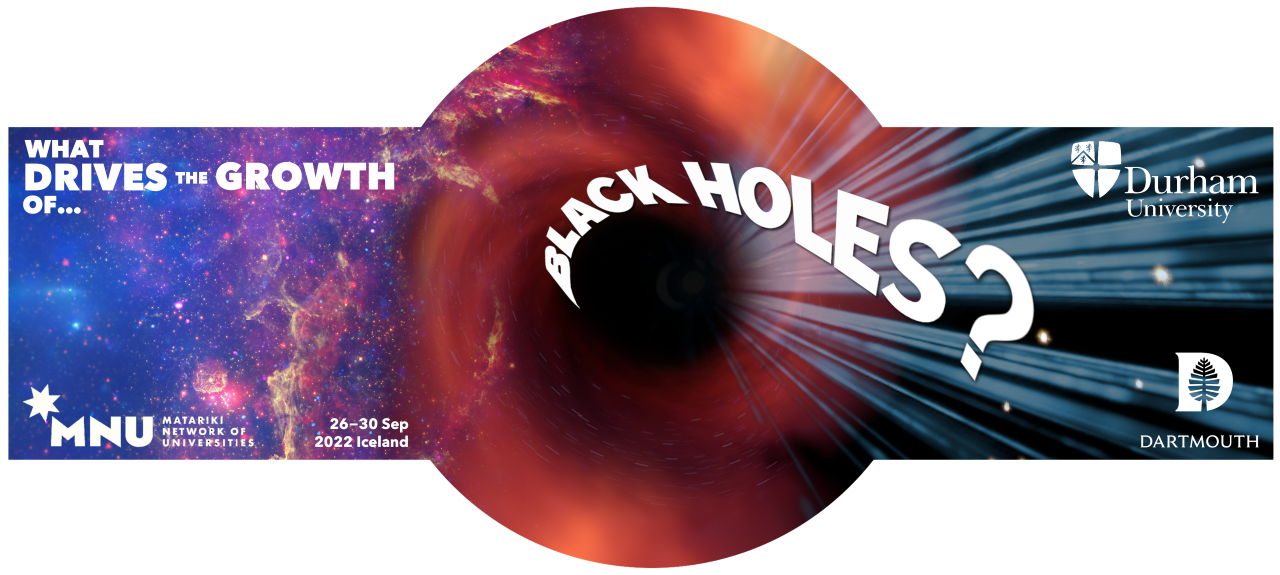|
Home
Back to landing page
Conference Poster
2012 Review Article
Abstract Submission (closed)
Registration
Conference booklet
Conference Venue
Conference Dinner Venue
COVID-19 Policy / Info
Code of Conduct
Moderator Guidelines
Contact:
bhgrowth.decade@durham.ac.uk




|
Volcanic activity
There has been an eruption from a volcano located near Fagradalsfjall (https://www.mbl.is/promos/elgosid-i-beinni/. The risk to populated areas and critical infrastructure is considered very low, and there are no disruptions to international aviation. You can see live streams here:
Livestream 1
Livestream 2
Workshop overview
"What drives the growth of black holes: a decade of reflection"
in Reykjavik, Iceland, 26th-30th September 2022
Massive black holes are at once exotic and yet ubiquitous, residing at
the centres of massive galaxies in the local Universe. Recent years
have seen remarkable advances in our understanding of how these black
holes formed and grew over cosmic time, during which they are revealed
as Active Galactic Nuclei (AGN). The focus of this workshop is to
review our understanding of what drives the growth of black holes, to
reflect on the progress made in the last decade, and to look towards
expected future advances enabled by conceptual and technological
improvements.
The scientific sessions of the conference will be broadly the same as
our first workshop in 2010 on "What drives the growth of black holes?",
allowing for a direct comparison of progress made in the last decade:
• How does the gas accrete onto black holes, from kpc to sub-pc
scales?
• What properties of the host galaxies or larger-scale environment
affect black-hole growth?
• What fuels the rapid growth of the most massive (and also the first)
black holes?
• What impact do AGN winds/jets/outflows have on the black-hole
fueling and star formation?
This conference is the latest in our Durham-Dartmouth black-hole
series. In deference to our previous meetings it will not be held in
either Dartmouth or Durham but will be hosted in the iconic Harpa
conference centre in Reykjavik so we can face Eyjafjallajokull, the
infamous Iceland volcano that shut down European airspace in April-May
2010. This calamitous event led to the cancellation and subsequent
rescheduling of our original workshop on
"What drives the growth of black holes?".
Our latest conference, a celebration of the subsequent
progress made over the last decade, was originally scheduled for 2020
but had to be rescheduled to 2021 and then again to 2022 due to
covid19... yes nature seems to be inherently linked to our workshop series!
We hope to see you in Iceland over 26th-30th September 2022 to
celebrate the last decade of progress on "What drives the growth of black holes?"
Meeting Format
The conference will be hosted at the iconic Harpa conference centre
with four full days of scientific presentations and discussion and a
full-day mid-week excursion out to Eyjafjallajökull, the infamous
Iceland volcano that has left an indelible mark on our black-hole workshop series!
The venue has a capacity of 185, which means that in-person attendance
will be limited. The meeting will be available in a hybrid format for those who
are unable to attend in person to join virtually. Please see the COVID-19 Information link in the menu
to the left for updates on covid restrictions and protocols.
Registration and Abstract submission
Abstract submission is now open, and the full registration pages will be opened shortly after the abstract deadline.
The regular in-person registration fee will be 80,000 Icelandic Krona (ISK) and a reduced fee of 50,000 ISK
will be charged for students. The registration fee covers use of the venue, the evening reception, refreshment
breaks, and the conference dinner at the Gamla bió. The full-day
excursion will be available for an additional charge - cost and details to be confirmed. Remote participation
will be available for a registration fee of 16,000 ISK and will allow remote participants to present a
short poster talk. The expectation is that conference speakers will deliver their talks in person.
The majority of the scientific programme will be based on submitted abstracts and will be announced in early June.
Tweeting the Meeting
The official twitter account of the meeting is
@BHGrowthDecade. Follow us
for updates, and use the hashtag #BHGrowth2022 to spread the word!
"Local" Organizing Committee
David Alexander (Durham) *
Ryan Hickox (Dartmouth) *
Leah Morabito (Durham) *
George Lansbury (ESO)
Tonima Ananna (Dartmouth)
Carolina Andonie (Durham)
Alice Eltvedt (Durham)
Emmy Escott (Durham)
Vicky Fawcett (Durham)
Brivael Laloux (Durham)
James Petley (Durham)
Grayson Petter (Dartmouth)
Stephanie Podjed (Dartmouth)
Kelly Whalen (Dartmouth)
* Denotes co-chairs and designated points of contact for all matters related to the code of conduct.
Science Organizing Committee
David Alexander (Durham, co-chair)
Ryan Hickox (Dartmouth, co-chair)
James Aird (Edinburgh)
Francoise Combes (Observatoire de Paris)
Sara Ellison (Victoria)
Eilat Glikman (Middlebury)
Chris Harrison (Newcastle)
Cristina Ramos Almeida (Instituto de Astrofísica de Canarias)
Benny Trakhtenbrot (Tel Aviv)
Marta Volonteri (Institut d'Astrophysique de Paris)
Dominika Wylezalek (Heidelberg)
Nadia Zakamska (Johns Hopkins)
|




